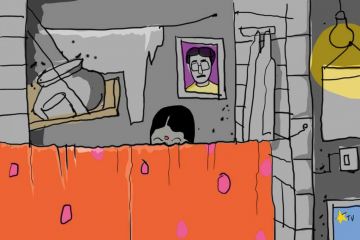
An auto rickshaw pulls
into the quiet curves of Bandra Bandstand. Streetlights illuminate the seafront
promenade, waves crash on the rocks below, but not a soul stirs.
Ratan Singh steps out
of the auto. He reaches into his pocket and pays the driver; they exchange a
few words. The driver points to a weathered white building that says Galaxy
Apartments. Ratan pulls his jacket shut and limps across the street. He sits on
a bench from where the patron of Galaxy Apartment, Salman Khan, might





